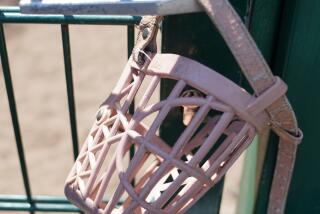‘Proud of Recognition’ : S.D. Humane Society Wins High Praise
From the prosaic dogs and cats to horses, snakes, quail and ring-necked pheasants, there are few species of local fauna that have not passed through San Diego’s Humane Society. In all, it handled more than 10,000 animals last year.
The number and variety of the animals processed was only one of the reasons that the society was awarded a five-star rating by the American Humane Society this year--one of only seven humane societies in the United States to receive this distinction. The stars were given for the society’s facilities and staff, operational program, euthanasia procedures, public relations and planning.
According to Jennifer Orme of the national organization, who toured the facility in May, San Diego’s full-time veterinarian and holding facilities set it apart. “They obviously set a high priority on keeping the pets healthy,” she said. “We’re proud of this recognition from those who know and understand what our work is all about,” said Capt. Fred J. Lee, executive director of the San Diego society.
With a full-time staff of 30 and numerous volunteers, the society covers all of San Diego County, investigating cases of animal abuse, performing euthanasia, spaying and neutering, and placing unwanted pets for adoption.
While two-thirds of the animals that the San Diego society sees are dogs or puppies, the office handles many animals that other agencies cannot. Horses are one species that have increasingly fallen victim to abuse, according to society spokesman Larry Boersma.
“We’re seeing a lot of new owners who don’t have the experience to care for a horse properly,” he said.
Historically, it was the abuse of draft animals--horses and mules--that led to the founding of the society in San Diego, Boersma said.
Today, the society has 10 full-time officers who investigate cases of animal abuse. After receiving an initial report of abuse, the officers will inspect the animal’s condition. If attempts to educate the owner on how to better care for the animal fail, citations or even impounding of the animal may follow. In the last nine months alone, the officers, who are empowered but not funded by the state, have investigated 3,800 cases and impounded more than 100 animals.
Once they have been brought to the society or been confiscated from their owners, most of the adoptable pets are put up for adoption. But the society has found other uses for the beasts as well.
Vans filled with bunnies, birds and puppies go out to local schools, where children get hands-on lessons in pet care. This year, 13,000 children at 118 schools have participated in this program. At the society’s Sherman Street headquarters, a simulated barnyard gives city children the taste and feel of farm life.
Another program called Pet Assisted Therapy uses the warm, friendly critters to brighten the days of senior citizens in convalescent hospitals, according to Boersma.
“It’s been medically proven that fondling an animal will aid their condition,” he asserted.
While many animals are brought to the society to be put to sleep, all adoptable animals are given at least two weeks’ grace before they are put down, and the majority are adopted in two or three days, Boersma said. Typically, a fee is charged for each pet, with puppies running from $35.75 on up. But a new program called Pets for People provides a small number of animals to senior citizens free of charge.
The society does all this on a $1-million annual budget that comes entirely from fees and private donations.
And while the Humane Society is best known for its selection of lovable mutts, many of the animals are purebreds, and a few even have papers to prove it.
“Why, we have one registered quarter horse that’s just waiting for a new owner right now,” Boersma said.
More to Read
Sign up for Essential California
The most important California stories and recommendations in your inbox every morning.
You may occasionally receive promotional content from the Los Angeles Times.










